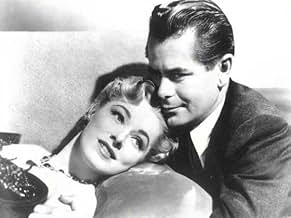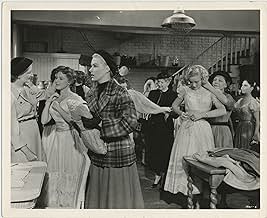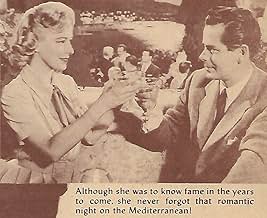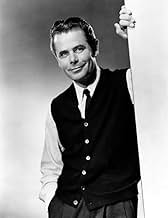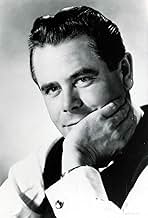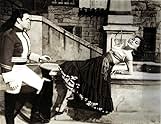IMDb रेटिंग
6.7/10
1.3 हज़ार
आपकी रेटिंग
अपनी भाषा में प्लॉट जोड़ेंThis movie chronicles Australian-born opera star Marjorie Lawrence's success, her battle with polio, and her eventual career comeback.This movie chronicles Australian-born opera star Marjorie Lawrence's success, her battle with polio, and her eventual career comeback.This movie chronicles Australian-born opera star Marjorie Lawrence's success, her battle with polio, and her eventual career comeback.
- निर्देशक
- लेखक
- स्टार
- 1 ऑस्कर जीते
- 1 जीत और कुल 3 नामांकन
Phyllis Altivo
- Louise
- (बिना क्रेडिट के)
Benjie Bancroft
- Doctor
- (बिना क्रेडिट के)
Francis Barnes
- Singer
- (बिना क्रेडिट के)
Louise Bates
- Party Guest
- (बिना क्रेडिट के)
Mary Bayless
- Backstage Well-Wisher
- (बिना क्रेडिट के)
George Blagoi
- Audience Member
- (बिना क्रेडिट के)
Heinz Blankenburg
- Baritone
- (बिना क्रेडिट के)
Lulu Mae Bohrman
- Backstage Well-Wisher
- (बिना क्रेडिट के)
फ़ीचर्ड समीक्षाएं
MGM fashioned a sumptuous, full-scale production in bringing the career of Australian opera diva Marjorie Lawrence to the screen. Heading the cast as Lawrence is the fine Eleanor Parker, in one of her most impressive roles. Co-starring as her supportive doctor-husband is the talented Glenn Ford. Both are most convincing in relaying the inspirational "real life" story of their struggle with physical- career- and marital-obstacles.
Whether Lawrence did in fact sing roles which included lyric soprano, dramatic soprano, mezzo and Wagnerian, as depicted here, is open to question. Still, it is lovely to see these excerpts staged so beautifully, and in gorgeous Technicolor. Of invaluable assistance is the magnificent voice of Eileen Farrell in a remarkably varied repertoire.
It may not be possible to experience the real impact of these scenes unless there is a special house revival with a full-sized Cinemascope screen and stereo sound. The formats of VHS and even DVD to not do justice to the original production.
Although Lawrence assisted on the script, the actual unfoldment has the ring of fact merging with fiction for maximum dramatic impact. Now that Lawrence's 30's and 40's career is but a memory in the minds of a few, what remains is this romanticized version of history. As such, lovers of romantic drama and of music may revel in a tale of ardor and challenge, with the artistic product being the "fusion of the arts": grand opera.
Whether Lawrence did in fact sing roles which included lyric soprano, dramatic soprano, mezzo and Wagnerian, as depicted here, is open to question. Still, it is lovely to see these excerpts staged so beautifully, and in gorgeous Technicolor. Of invaluable assistance is the magnificent voice of Eileen Farrell in a remarkably varied repertoire.
It may not be possible to experience the real impact of these scenes unless there is a special house revival with a full-sized Cinemascope screen and stereo sound. The formats of VHS and even DVD to not do justice to the original production.
Although Lawrence assisted on the script, the actual unfoldment has the ring of fact merging with fiction for maximum dramatic impact. Now that Lawrence's 30's and 40's career is but a memory in the minds of a few, what remains is this romanticized version of history. As such, lovers of romantic drama and of music may revel in a tale of ardor and challenge, with the artistic product being the "fusion of the arts": grand opera.
Like others commenting on this film, I saw "Interrupted Melody" many years ago, and it left a deep impression on me. I found when watching it again that I had retained so many of the scenes in my memory.
"Interrupted Melody" tells the story of Australian soprano Marjorie Lawrence (played by Eleanor Parker), who was stricken with polio at the height of her career. The singer then has to find the courage to reclaim her will to live, her voice, and her career.
This is one of the few films, including anything of Lanza's, where entire arias and/or operatic scenes have been performed - and correctly. Singing for Ms. Parker is dramatic soprano Eileen Farrell, whose voice also acts. In the beginning, when the young Marjorie is in a vocal competition, Farrell takes her powerful chest voice out and instead carries her middle voice down to the low notes, giving the impression of a young, untrained singer. Truly inspired.
This has to be the high point of Eleanor Parker's career. I had a chance to see her nearly 30 years ago in a preview performance of "Pal Joey" - regretfully, there were many problems and she and her costar left the show before it opened. It was a shame, because Parker's Vera was wonderful. Here, she plays the young Marjorie with energy and determination, capturing the soprano's nervousness at being away from home when she goes to school in Monte Carlo. Later, she plays the perfect diva not afraid to state what she wants. Finally, she's the crippled Marjorie with no will to live, finding solace entertaining wounded soldiers who are worse off than she is. All through the film, she looks absolutely stunning, and her lipsyncing in Italian, French, and German is perfect.
The music is glorious - "Tristan und Isolde," "La Boheme," "Samson et Delilah," "Carmen," "Il Trovatore," (the fastest I've ever heard it), "Madama Butterfly," "Don Carlos," and "Gotterdammerung" - truly a feast for the ears with Eileen Farrell's magnificent singing.
Some have questioned whether or not Lawrence actually sang both mezzo and soprano roles. Lawrence did sing "Carmen," which can be sung by a dramatic soprano. Also, Lawrence probably started out as a mezzo - it was not until she trained in Paris that her upper range was extended. She sang Wagner, Strauss, Puccini, and Verdi in the big opera houses. "Samson and Delilah" was perhaps done for the film so we could see Eleanor Parker being sexy and seductive in a gauzy costume. The thing is, Lawrence's specialty was Wagner and you can't only have heavy Wagner scenes throughout a movie. The glamorous soprano did her own dancing in "Salome," and played the immolation scene in "Götterdämmerung" by riding her horse into the flames as Wagner had intended, making her one of the few, possibly the only, soprano to do this. She also did Thais, which calls for sex and beauty - "Thais" was the inspiration for the role Susan Kane bombed in during "Citizen Kane."
Glenn Ford plays Lawrence's husband, Dr. Thomas King, and the marriage of a successful opera star and fledgling pediatrician is realistically portrayed with all its difficulties. In real life, Tom King was an osteopath and a Christian Scientist. Ford has a background role much of the time, but also some very dramatic moments and some romantic ones. His gentle, easygoing style fit the character well. A very young Roger Moore is Marjorie's manager-brother.
If you love opera, or if you love a story of courage and the power of the human spirit, this film is for you. Have a box of tissues nearby - the ending is very powerful.
"Interrupted Melody" tells the story of Australian soprano Marjorie Lawrence (played by Eleanor Parker), who was stricken with polio at the height of her career. The singer then has to find the courage to reclaim her will to live, her voice, and her career.
This is one of the few films, including anything of Lanza's, where entire arias and/or operatic scenes have been performed - and correctly. Singing for Ms. Parker is dramatic soprano Eileen Farrell, whose voice also acts. In the beginning, when the young Marjorie is in a vocal competition, Farrell takes her powerful chest voice out and instead carries her middle voice down to the low notes, giving the impression of a young, untrained singer. Truly inspired.
This has to be the high point of Eleanor Parker's career. I had a chance to see her nearly 30 years ago in a preview performance of "Pal Joey" - regretfully, there were many problems and she and her costar left the show before it opened. It was a shame, because Parker's Vera was wonderful. Here, she plays the young Marjorie with energy and determination, capturing the soprano's nervousness at being away from home when she goes to school in Monte Carlo. Later, she plays the perfect diva not afraid to state what she wants. Finally, she's the crippled Marjorie with no will to live, finding solace entertaining wounded soldiers who are worse off than she is. All through the film, she looks absolutely stunning, and her lipsyncing in Italian, French, and German is perfect.
The music is glorious - "Tristan und Isolde," "La Boheme," "Samson et Delilah," "Carmen," "Il Trovatore," (the fastest I've ever heard it), "Madama Butterfly," "Don Carlos," and "Gotterdammerung" - truly a feast for the ears with Eileen Farrell's magnificent singing.
Some have questioned whether or not Lawrence actually sang both mezzo and soprano roles. Lawrence did sing "Carmen," which can be sung by a dramatic soprano. Also, Lawrence probably started out as a mezzo - it was not until she trained in Paris that her upper range was extended. She sang Wagner, Strauss, Puccini, and Verdi in the big opera houses. "Samson and Delilah" was perhaps done for the film so we could see Eleanor Parker being sexy and seductive in a gauzy costume. The thing is, Lawrence's specialty was Wagner and you can't only have heavy Wagner scenes throughout a movie. The glamorous soprano did her own dancing in "Salome," and played the immolation scene in "Götterdämmerung" by riding her horse into the flames as Wagner had intended, making her one of the few, possibly the only, soprano to do this. She also did Thais, which calls for sex and beauty - "Thais" was the inspiration for the role Susan Kane bombed in during "Citizen Kane."
Glenn Ford plays Lawrence's husband, Dr. Thomas King, and the marriage of a successful opera star and fledgling pediatrician is realistically portrayed with all its difficulties. In real life, Tom King was an osteopath and a Christian Scientist. Ford has a background role much of the time, but also some very dramatic moments and some romantic ones. His gentle, easygoing style fit the character well. A very young Roger Moore is Marjorie's manager-brother.
If you love opera, or if you love a story of courage and the power of the human spirit, this film is for you. Have a box of tissues nearby - the ending is very powerful.
'Interrupted Melody' is the film adaptation of Australian soprano Marjorie Lawrence's autobiography. It tells the fascinating tale of the young woman's thunderous ascent to stardom, her marriage to Dr Thomas King (Glenn Ford), and finally deals with her struggles with polio.
The great Eleanor Parker delivers a fantastic performance as Lawrence (with the equally fine Eileen Farrell providing the voice of the Australian prima donna). Parker's acting here is wonderfully appropriate, and captures the intense but subtly delicate style of the great operatic stars of the time. With sumptuous sets, costumes and, of course, music, 'Interrupted Melody' seems to equate to a practically perfect film. In my opinion though, the reality is not quite the case. Lawrence's story is one that is wrought with drama and this movie just doesn't do it complete justice.
Nevertheless, 'Interrupted Melody' is a film worth seeing, for all the reasons mentioned earlier. There are many memorable scenes throughout the movie; the ones that deal with her battle against illness are particularly moving. And when, finally, she triumphs after a great fight, both emotionally and physically, it is indeed very poignant.
The great Eleanor Parker delivers a fantastic performance as Lawrence (with the equally fine Eileen Farrell providing the voice of the Australian prima donna). Parker's acting here is wonderfully appropriate, and captures the intense but subtly delicate style of the great operatic stars of the time. With sumptuous sets, costumes and, of course, music, 'Interrupted Melody' seems to equate to a practically perfect film. In my opinion though, the reality is not quite the case. Lawrence's story is one that is wrought with drama and this movie just doesn't do it complete justice.
Nevertheless, 'Interrupted Melody' is a film worth seeing, for all the reasons mentioned earlier. There are many memorable scenes throughout the movie; the ones that deal with her battle against illness are particularly moving. And when, finally, she triumphs after a great fight, both emotionally and physically, it is indeed very poignant.
I was fortunate enough to be chosen as the stunt double for Eleanor Parker in this extraordinary film. I was in awe of her performance and cannot say how much I enjoyed working with her for several of her films. I thought the script was marvelous and did win an award I believe. Eleanor Parker is the true lady she portrayed in this once in a lifetime film. I never tire of seeing it - over and over again.
I studied opera with Marjorie Lawrence and her students always enjoyed gathering to watch this film.
I studied opera with Marjorie Lawrence in the 1970's and she was an incredible, vital, and exciting personality. She was larger than life and her presence dominated any gathering she attended.
The movie captures many of her physical mannerisms. Her voice was most suited to the Wagnerian repertoire and the selection of the great Eileen Farrel to sing the more popular arias chosen for the film was an excellent one. However, Miss Lawrence was disappointed that her own voice wasn't used as had been agreed, which I understand resulted in a settlement in her favor.
Her husband, Doctor King, was an great gentleman and devoted to her.
Following the years depicted in the film, she became an educator at Southern Illinois University where she was very respected and loved.
The movie captures many of her physical mannerisms. Her voice was most suited to the Wagnerian repertoire and the selection of the great Eileen Farrel to sing the more popular arias chosen for the film was an excellent one. However, Miss Lawrence was disappointed that her own voice wasn't used as had been agreed, which I understand resulted in a settlement in her favor.
Her husband, Doctor King, was an great gentleman and devoted to her.
Following the years depicted in the film, she became an educator at Southern Illinois University where she was very respected and loved.
क्या आपको पता है
- ट्रिवियाEleanor Parker can read music, and has perfect pitch as a singer. She decided to study the scores of the opera songs used in this movie on her own. She rented a cabin in Lake Arrowhead, California, and played the records while singing along, until she had the breathing and phrasing memorized. Then when filming the scenes, instead of lip-synching to the tracks recorded by Eileen Farrell for the movie, she sang full voice (but an octave lower). She is proud of the fact that they never had to do a re-take, in order to "match" the tapes. She nailed it on the first take every time.
- गूफ़After Marjorie sings "Annie Laurie" and she wheels herself into the kitchen and she suggests a concert tour, right as she and Dr. King are embracing .
- भाव
Marjorie Lawrence: [drinking champagne] Tonight I love the whole world and I want them to know it.
Dr. Thomas King: And tomorrow you'll have a monumental hangover.
Marjorie Lawrence: That's the advantage of going out with doctors.
- कनेक्शनFeatured in 1955 Motion Picture Theatre Celebration (1955)
- साउंडट्रैकDon Carlos
(1867) (uncredited)
Music by Giuseppe Verdi
Libretto by François Joseph Méry and Camille du Locle
Aria "O don fatale" Performed by Eleanor Parker (dubbed by Eileen Farrell) with piano accompaniment
टॉप पसंद
रेटिंग देने के लिए साइन-इन करें और वैयक्तिकृत सुझावों के लिए वॉचलिस्ट करें
- How long is Interrupted Melody?Alexa द्वारा संचालित
विवरण
- रिलीज़ की तारीख़
- कंट्री ऑफ़ ओरिजिन
- भाषाएं
- इस रूप में भी जाना जाता है
- La melodía interrumpida
- फ़िल्माने की जगहें
- उत्पादन कंपनी
- IMDbPro पर और कंपनी क्रेडिट देखें
बॉक्स ऑफ़िस
- बजट
- $23,67,000(अनुमानित)
- चलने की अवधि1 घंटा 46 मिनट
- पक्ष अनुपात
- 2.55 : 1
इस पेज में योगदान दें
किसी बदलाव का सुझाव दें या अनुपलब्ध कॉन्टेंट जोड़ें




